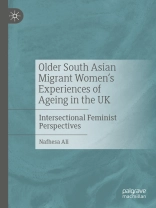Drawing on empirical research with older South Asian migrant women, this book puts forth new understandings on how older, settled, migrant women construct and understand age through recollections of key life course events that are structured around gendered positions. Divesting from a Western-centric view and applying a decolonial and Black feminist lens to ageing, the author presents intersectionality and transnational positionality as useful tools to connect old age, migration and memory in critical studies on aging. Chapters flesh out life course memories at different key stages and examines how the intersections of multiple markers of identity (race, gender, language, immigration status, age, etc.) shape how older South Asian migrant women understand and experience their lives.
This book will be of interest to scholars with a focus on Gender Studies, Migration Studies, Ageing Studies, and Mobility Studies.
Table des matières
1: Introduction.- 2: The ageing
ajnabee (
stranger): Meet the women.- 3:
Childhood (
bachpan): Memories of home and nostalgia.- 4:
Jawaani (youth): Young girls approaching puberty.- 5: Marriage and migration: Memories of love and loneliness.- 6: Motherhood: More to say and making mistakes.- 7: Later life: “
Kal dia galla (
yesterday’s conversations)” and lessons learnt.- 8: The end of life: Religion and reflections.- 9: Positionality.- 10: Conclusion.
A propos de l’auteur
Nafhesa Ali is an interdisciplinary sociologist with expertise in racialised and minority communities and everyday lives. She is a Lecturer in Sociology in the Department of Social Sciences at Northumbria University in Newcastle, UK. Her publications include books and journals on the themes of gender, age and migration, Muslim sexualities, environmental sustainability, and creative methods.












